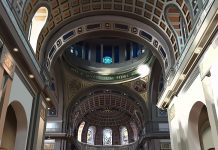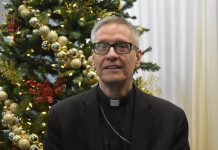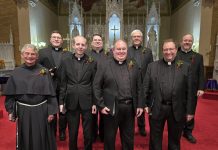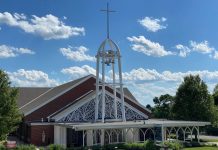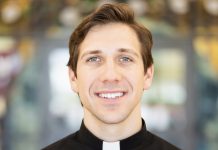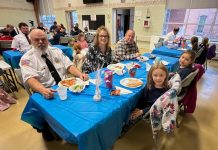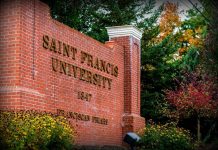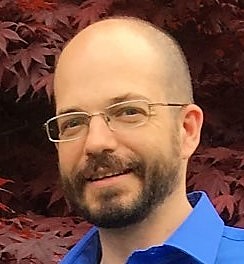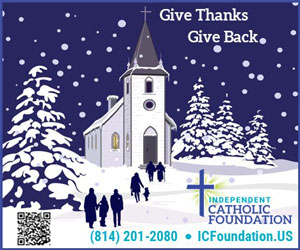Column by Andre McCarville
A friend of mine and I were talking about the tragic death of Kobe Bryant and his daughter. He mentioned how events like this make it difficult for his son to believe in an all-loving God. I think the question of suffering and loss is a difficult one that all Christians, and indeed all people throughout the world, have to deal with. If God is all-powerful, all-knowing, and all-loving, how can there be suffering and death in the world?
Perhaps you are familiar with the concept of the so-called “prosperity gospel.” The “prosperity gospel” will tell us that the reason things aren’t going well for us is that we don’t have enough faith. It would say that when you really believe, God will give you riches and health, and all good things. I wonder how the apostles, almost all of whom died for their faith, would view such a belief? If God Himself, when He came among us, was tortured and crucified, then we shouldn’t be surprised to find that not everything will go perfectly in our own lives.
So how then, as Catholics, do we respond to suffering, grief, and tragedy? God wants to give us a different picture than the one the prosperity gospel would paint. The image is not one of God preventing us from undergoing any suffering, but rather of a God who is with us in our suffering. Still the question lingers, why do we have to suffer at all?
While the answer to this has many facets, the first that we need to accept is human free will. God made us in His image and likeness. Part of that is having free will. We need to have free will to truly be in His image. Without free will, we cannot love. If God is love as 1 John 4:8 states, it is a requirement to love to be made in His image. For example, if you created a robot and programmed it to love you, you would never believe it truly did. If it seemed to love you, it was only because it was only doing what it was programmed to do. There was no choice in the matter, nor any gift of self. In one sense the robot is a slave, giving because it has to, and not because it wants to.
God does not want us to love merely because we have to. God desires our love to be a free gift of self to the other. For us to be able to give this free gift, we can’t be robots who are programmed to love. We have to be free. Unfortunately with this freedom to love comes its converse, the freedom to hate, or the freedom to be indifferent, both of which lead to a great deal of suffering in this life.
Many can accept the ideas of human free will and the problem of human created pain, but still rightfully wonder how natural disasters, diseases, and even helicopter accidents fit into this. When we hear about a tsunami or an earthquake leveling a poor region of the world, or when a hurricane hits our country, or a legend goes down in a tragic accident, or a loved one is lost to a terminal illness, we have to wonder, “Why God?”
It is a good question, and one not easily answered. In some ways, our free will still factors in to this. We should look first at the story of Adam and Eve, the Original Sin, and the Fall of Humanity. While there is much to learn from this story, one lesson of importance is that the choices we make influence more than just ourselves. When hearing of the Original Sin, which is a stain that has been passed down from our original parents to ourselves, many complain that the Original Sin was not their fault, and don’t know why they should pay the price for something someone long ago once did. But what we should understand from the Original Sin is that the choices of others play out in many of our own life situations. For example, when a child was born into slavery, it was no fault of that child’s that they were there. It was rather the slave-owner and the slave traders that made the slavery possible. The child just suffered the effects.
Another example comes from an experience I had in college. I had parked in a legitimate parking spot and went to class. When I returned from class I saw a car on the street next to mine, and police surrounding the area. I looked, and to my dismay I saw that my car had been wrecked. The car next to mine was stolen. The driver of the stolen car was driving too fast and somewhat recklessly and had run into my car. They left the car there and ran off. It was not my fault that the other car ran into my own. But the choice of the driver of the stolen car still impacted me.
Some choices that influence us are not even sinful, per se, nor were they conducted with mal-intent, but they have influenced us nonetheless. How many of us chose the location where we would be born? Who among us chose the governmental system we were born under or the conditions of the world we were born into? Although we had no choice in the matter, the choices of others impacted us all the same. Similarly, the Original Sin wasn’t our choice, but it still affects us.
So how does this relate to suffering and loss in the world? When we look at diseases in the world, many are the result of forces we do not understand. Still, humans as a species may have had a hand in their propagation. One such example is that many diseases that humans are struggling with seemed to be passed from animals to humans. Thereby the decision of humans to live in close proximity to animals, our relationship to those animals, and the decision to cultivate livestock – while not in any way inherently sinful – may have had ramifications for the greater human population.
In like manner, while we also do not yet fully understand cancer, we do have a basic grasp that exposing ourselves to certain substances, or having someone else expose us to them, may lead to a greater chance of having cancer. Even natural disasters, while we may not have felt we contributed to their creation, have at least some element of human free will when considering their impact on societies: whether it is contributing to climate change, or just choosing to remain in a region prone to natural disasters, or even because our ancestors moved to such a place and we don’t feel we have the resources to leave. For instance, for many in central Pennsylvania, we know that blizzards and ice storms are a possibility, yet most of us have weighed the risk of them versus moving to a new location, and we choose to stay. The same could be suggested for those who live in hurricane or earthquake prone regions.
This is not to say that all of these choices meant the people choosing them were bad. Nor does it mean that we need to return to hunter/gatherer societies that live in a part of the world that do not have any natural disasters, diseases or problems, as there are none. It just illustrates that every choice we make has an impact both for us, and for the world around us.
Another part of the response to suffering has to do with the natural world needing a certain freedom to act according to its own “laws”. C.S. Lewis once suggested that for free will to mean anything, we must live in a world that is similarly free. If every time you made a decision, God would save you from the bad effects of such a decision, there wouldn’t be true freedom. There would be no need for bravery, loyalty, self-sacrifice or even love in such a world. The world acts according to the rules it is governed by, so that the choices we make have some value.
While what has been said may make some sense, none of this is a comfort when we are experiencing the loss of someone we care about. We want God to make sense, and we want all of the things that are happening around us to make sense. Unfortunately, this is something they do not always do. It has been said that the human brain is the most complex system we are currently aware of in the universe, and if the human brain were so simple that we could understand it, we would be so simple that we could not. How much more so are the inscrutable ways of the God of the universe?
One other perspective we need to consider is the question of pain. Many in our society view pain as the greatest evil that there is. At a symposium on addiction, I recently learned that much of the opioid crisis began in the 1990s with this mentality. If pain was the chief problem, we could eliminate pain with pain-killers. This allowed too many pain-killers to be out among the public, which contributed greatly to the problem. But perhaps we need to realize that suffering isn’t all bad. In the gym, there is one statement that is frequently used counter to this notion: “No pain, no gain.” This, of course, meaning that suffering a little allows one to become stronger. Here is where faith comes in: we recognize there are some things we cannot yet understand, but we trust God is at work to bring good through even the worst of evils.
I heard Ravi Zacharias tell this story from medieval folklore: A man lost his horse. It ran away one day. His neighbor came to him and said, “That’s a real shame. What bad luck that you lost your horse.” The man who lost his horse replied, “What do I know about good luck and bad luck?”
A few days later the horse returned and brought with it twenty wild horses. The neighbor came to him again and said, “Wow, that’s amazing! It’s not bad luck, it’s good luck! The horse came back and now you have twenty more!” The man responded again, “What do I know about good luck and bad luck?”
The man’s young son decided he wanted to tame one of the wild horses. While going out to tame it, the horse bucked and kicked and broke the young son’s leg. The neighbor returned and said, “Isn’t it terrible that these horses came? They broke your son’s leg. They turned out to be bad luck after all.” The man replied, “What do I know about good luck and bad luck?”
A few days later a group of thugs came through the land looking for new recruits for their gang. They were looking for all the able-bodied young men to force them to join their group. They were about to take the man’s son, when they noticed his leg was broken. Seeing the young man as a liability more than an asset, they decided to move on. The neighbor came back and said, “Isn’t it good luck that your son’s leg was broken?”
With that being said, when a person in the prime of life, such as Kobe Bryant, or his daughter, who had her whole life ahead of her, loses their life, it rightly causes us to step back and question “why.” There is no easy answer. But it often causes each of us to re-examine our own lives. We will not eternally be here on earth, so what are we doing with our lives while we are alive? If we met God now, what would we have to show for our lives? If we died tomorrow, what would we leave behind? In this way, the death of another can wake many of us up to the reality of death, and the necessity of getting to the business of life. We have to make the most of our lives while we have the opportunity.
There are not simple answers in the face of tragedy. There shouldn’t be. They aren’t meant to “make sense”. Rather, in the face of the big questions of life, with the challenges that ensue, our faith is meant to strengthen us as we go through them. Then the love of God, and of our friends, family and faith community, are can be there to sustain us.
As Catholics, we can pray for the souls of Kobe Bryant, his daughter, Gianna, and all those who died in the helicopter crash. We can pray for those who have died from the Coronavirus, cancer, heart disease, and so many other illnesses that we may not understand. We can pray for those who live in war-torn parts of the world, situations of violence, are considering suicide, or are trapped through human trafficking. We can pray for those who have lost their lives from natural disasters. And hopefully, in our prayer, we are inspired to reach out in charity to those who have been hurt, to look for cures for diseases, seek peace in conflict, defend the defenseless, counsel the struggling, and try to find ways to protect the vulnerable from the ravages of natural disasters. But whether or not these solutions come, or we ever get answers to our many questions, our faith is there to strengthen us through the hard times. It gives us what we need to continue on, even when we don’t understand.
Andre McCarville is the Director of Missions and Family Life for the Diocese of Altoona-Johnstown. He is also the diocese’s Catholic Campus Minister at Penn State Altoona.


